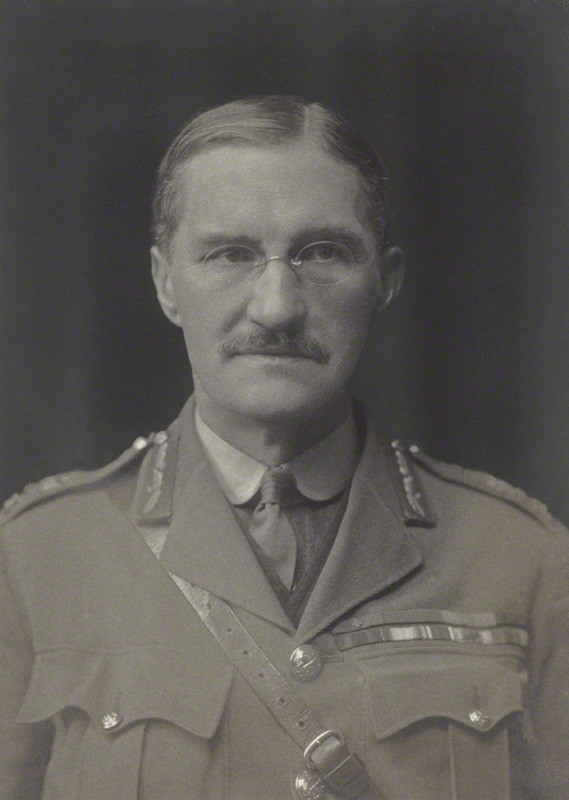William Babtie is Pauline Roche’s son-in-law, by Edith Barry’s second marriage, so is a second cousin twice removed, by marriage, rather a lot of twos.

Major William Babtie, was born in Scotland 7 May 1859, the eldest son of John Babtie, JP, of Dumbarton. He was educated at the University of Glasgow, and took his MB degree in 1880, entering the Army Medical Service on 30 July 1881. He served during the international occupation of Crete as Senior Medical Officer 1897-98, and was created a CMG (1899), also in South Africa on the Staff of the Natal Army, when he was present at all the actions for the relief of Ladysmith and the subsequent operations in Natal and Eastern Transvaal. When describing the battle of Colenso, Sir A Conan Doyle says: ‘For two hours the little knot of heart-sick humiliated officers and men lay in the precarious shelter of the donga, and looked out at the bullet-swept plain and the line of silent guns. Many of them were wounded. Their chief lay among them, still calling out in his delirium for his guns. They had been joined by the gallant Babtie, a brave surgeon, who rode across to the donga amid a murderous fire and did what he could for the injured men’. Later in the day we are told how Major Babtie went out with Captain Congreve to bring in Lieutenant Roberts. For his services in this campaign Major Babtie was mentioned in Despatches, promoted Lieutenant Colonel, received the Medal with five clasps, and the Victoria Cross. The London Gazette, 20 April, 1900, states: ‘William Babtie, CMG, Major, Royal Army Medical Corps. At Colenso, on the 15th December 1899, the wounded of the 14th and 66th Batteries, Royal Field Artillery, were lying in an advanced donga close to the rear of the guns, without any medical officer to attend to them; and when a message was sent back asking for assistance, Major W Babtie, RAMC, rode up under a heavy rifle-fire, his pony being hit three times. When he arrived at the donga, where the wounded were lying in a sheltered corner, he attended to them all, going from place to place exposed to the heavy rifle-fire which greeted anyone who showed himself. Later on in the day Major Babtie went out with Captain Congreve to bring in Lieutenant Roberts, who was lying wounded on the veldt. This also was under a heavy fire’.
In 1903 Lieutenant Colonel Babtie married Edith Mary, daughter of W H Barry, of Ballyadam, County Cork, and widow of Major P A Hayes, AMS. They had one daughter. From 1901 to 1906 he was Assistant Director-General Army Medical Service, War Office; from 1907 to 1910, Inspector of Medical Services; from 1910 to 1914, Deputy Director-General, and in 1912 he was created a CB. During the Great War he served from 1914 to 1915 as Director of Medical Services in India, and from 1915 to 1916 as Principal Director of Medical Services in the Mediterranean, during the operations in Egypt, the Dardanelles and Salonika. For his services in connection with the Expeditionary Forces in that area he was mentioned in Despatches and created a KCMG on 1 January 1916. In 1916 he became a Director and in 1918 Inspector of Medical Services at the War Office, retiring with the rank of Lieutenant General in 1919, and was created a KCB on 3 June 1919. General Babtie was an Honorary Surgeon to His Majesty from 1914 to 1919, and is a Knight of Grace of the Order of St John of Jerusalem in England and an LLD of the University of Glasgow. He died at Knocke, Belgium, on 11 September 1920, aged 61.
VC, KCB, KCMG, QSA (5), 1914-15 Star, BWM, VM, 1911 Coronation Medal, Order of St John of Jerusalem (Knight of Grace).
Source: VC recipients (VC and DSO book)
LEUTENANT GENERAL SIR WILLIAM BABTIE
VC KCB KCMG KStJ KHS MB LRCP&S (Ed) Hon LID (Glas)
Mentioned in Despatches 1899, 1915, 1916
15 Dec
On this day in December 1899, Lieutenant General Sir William Babtie VC KCB KCMG KStJ KHS MB LRCP & S (Ed) Hon LID (Glas) was awarded the Victoria Cross.
âAt Colenso, on the 15th December 1899, the wounded of the 14th and 66th Batteries, Royal Field Artillery, were lying in an advanced donga close to the rear of the guns, without any medical officer to attend to them: and when a message was sent back asking for assistance, Major W Babtie RAMC rode up under a heavy rifle-fire, his pony being hit three times. When he arrived at the donga where the wounded were lying in a sheltered corner, he attended to them all, going from place to place, exposed to the heavy rifle-fire which greeted anyone who showed himself. Later on in the day, Major Babtie went out with Capt Congreve to bring in Lieut Roberts, who was lying wounded on the veldt. This also was under a heavy fireâ.
5 Sept 1903 At the Cathedral, Westminster, married Edith Mary Hayes, widow of Major P. A. Hayes AMS, and daughter of W Barry of Ballyadam County Cork.
HAYES, Captain, WILLIAM, D S O, The Queen’s (Royal West Surrey Regiment). Died of influenza 20 October 1918. Age 27. Son of Major P. A. Hayes, of Dingle, Co. Kerry, and of Lady Babtie (nee Barry), of Carrigtwohill, Co. Cork. Grave Ref. I. C. 19.